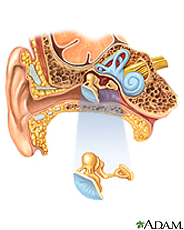
11/10/2016 04:13 PM EST
Source: American Tinnitus Association
Related MedlinePlus Page: Tinnitus
Related MedlinePlus Page: Tinnitus

11/10/2016 04:13 PM EST
Source: National Institute on Deafness and Other Communication Disorders - 
Related MedlinePlus Page: Tinnitus

Related MedlinePlus Page: Tinnitus
Tinnitus is often described as a ringing in the ears. It also can sound like roaring, clicking, hissing, or buzzing. It may be soft or loud, high pitched or low pitched. You might hear it in either one or both ears.
Millions of Americans have tinnitus. People with severe tinnitus may have trouble hearing, working or even sleeping.
Causes of tinnitus include
- Hearing loss in older people
- Exposure to loud noises
- Ear and sinus infections
- Heart or blood vessel problems
- Meniere's disease
- Brain tumors
- Hormonal changes in women
- Thyroid problems
- Certain medicines
Treatment depends on the cause. Treatments may include hearing aids, sound-masking devices, medicines, and ways to learn how to cope with the noise.
NIH: National Institute on Deafness and Other Communication Disorders
- The 'Love Hormone' May Quiet Tinnitus (09/23/2016, HealthDay)
- Noise and Hearing Protection (American Academy of Otolaryngology--Head and Neck Surgery)
 Are There Treatments That Can Help Me?
Are There Treatments That Can Help Me?  (National Institute on Deafness and Other Communication Disorders)
(National Institute on Deafness and Other Communication Disorders)- Ginkgo
 (National Center for Complementary and Integrative Health)
(National Center for Complementary and Integrative Health)  Treatment Options (American Tinnitus Association)
Treatment Options (American Tinnitus Association)
- Hyperacusis: An Increased Sensitivity to Everyday Sounds (American Academy of Otolaryngology--Head and Neck Surgery)
- Noises in the Ears (DSHI Systems)
- Can Magnetic Coil Ease Tinnitus? (Department of Veterans Affairs)
- Tinnitus: Is This What Happens When the Brain's Gatekeeper Breaks Down?
 (National Institute on Deafness and Other Communication Disorders)
(National Institute on Deafness and Other Communication Disorders)
- ClinicalTrials.gov: Tinnitus
 (National Institutes of Health)
(National Institutes of Health)
- Article: Hyperbaric oxygen therapy in tinnitus with normal hearing in association...
- Article: The Agreement between Protocols for the Investigation of Asymmetrical Audiovestibular...
- Article: Angiotensin-Converting Enzyme (ACE) I/D and Alpha-Adducin (ADD1) G460W Gene Polymorphisms...
- Tinnitus -- see more articles
- American Tinnitus Association
- Find an Audiologist (American Academy of Audiology)
- Find an ENT (American Academy of Otolaryngology--Head and Neck Surgery)
- National Institute on Deafness and Other Communication Disorders

- Can Loud Music Hurt My Ears? (Nemours Foundation)Also in Spanish
- When Your Child Has Tinnitus (American Academy of Otolaryngology--Head and Neck Surgery)






















.png)











No hay comentarios:
Publicar un comentario